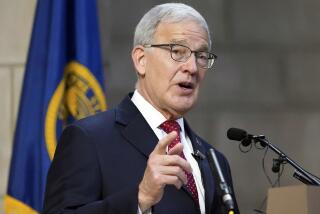Dissident can run in Nigeria election
- Share via
PORT HARCOURT, NIGERIA — With just days to go before Nigeria’s presidential election, a top opposition leader Monday won the right to run, throwing the race to rule Africa’s most populous nation wide open.
The unanimous Supreme Court decision allowing Vice President Alhaji Atiku Abubakar to run followed street protests and widespread reports of rigging in state elections over the weekend, which raised questions about the health of Nigeria’s democracy.
The Independent National Electoral Commission had excluded Abubakar and several other opposition candidates accused of corruption by the government, prompting questions about the panel’s independence from President Olusegun Obasanjo’s regime.
Local observers reported violence, intimidation, ballot box stuffing and theft, closed polling stations and other serious irregularities during Saturday’s state elections. European observers said the balloting was seriously flawed.
“What happened on Saturday was absolutely not an election. It was worse than robbery,” Abubakar told journalists.
The Supreme Court ruling also raises doubts about several of the state elections in which gubernatorial candidates were excluded because of corruption charges.
Obasanjo and Abubakar were allies in the ruling People’s Democratic Party until the vice president successfully opposed his chief’s efforts last year to change the constitution to seek a third term of office.
Obasanjo backed Umaru Yar Adua as the ruling party candidate. Abubakar defected to the opposition Action Congress. Another popular opposition candidate is former military ruler Muhammadu Buhari of the All Nigeria People’s Party.
The presidential vote Saturday will see the first transfer of power from one civilian leader to another through elections in Nigeria’s postcolonial history.
The nation was largely controlled by the military from the time it won independence from Britain in 1960 until the election of Obasanjo, himself a former military ruler, in 1999. His reelection in 2003 was criticized by international observers as fraudulent.
Abubakar’s late admission to the presidential race leaves him at a disadvantage, with just days to organize and campaign. The 61 million ballots have been printed without his name, and the electoral commission has made no comment on how the problem will be resolved, with speculation that stickers may be added to ballots.
Whatever the solution, the ruling poses a severe logistical problem for the commission, which failed to get voting materials out on time for last weekend’s election, causing many polling stations to open hours late.
Anyakwee Nsirimovu, spokesman for the Stakeholder Democracy Network based in Port Harcourt, said the court decision was a victory for the rule of law and democracy.
“I think it has also deflated this attitude of the ruling political party, and their preference for using fear and manipulation rather than letting the opposition participate,” he said in a phone interview.
“I think the emergence of Atiku adds a lot of vibrancy because people have a choice. People know the stories [alleging corruption by Abubakar] and Nigerians can make their own decision about that.”
There were protests Monday in various Nigerian cities after the electoral commission announced that the ruling party had won 21 of the 36 states, compared with six for opposition parties, with the count incomplete. In some states youths burned down electoral offices. In others women protested with bare breasts to shame the authorities, local television reported.
In the dilapidated, poverty-stricken town of Okrika outside Port Harcourt, in oil-rich Rivers state, people complained that there was no chance to vote.
“In Okrika I don’t think we had an election, Blessing Hezekiah, 49, an unemployed welder, said in an interview. “We went to vote. We had no ballot boxes here, no ballot papers. People were angry.”
*
More to Read
Sign up for Essential California
The most important California stories and recommendations in your inbox every morning.
You may occasionally receive promotional content from the Los Angeles Times.













